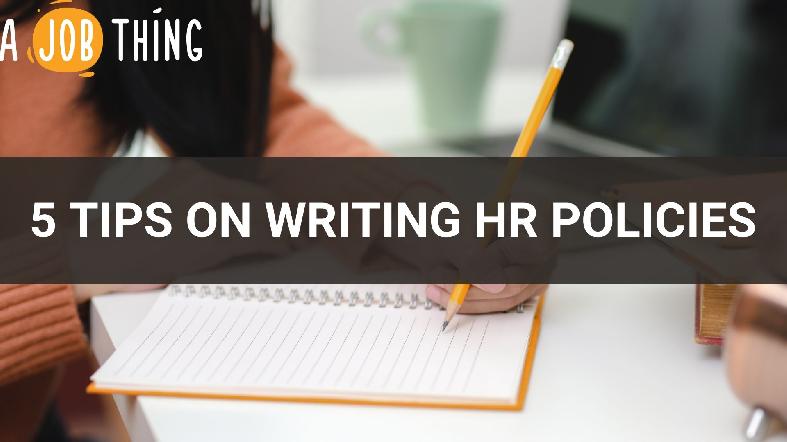
Five Things You Must Remember When Writing HR Policies
Create Job Description Using AI
Write appealing job descriptions for any job opening to attract the most qualifield and suitable candidates. FOR FREE.
try now
HR policies are essential to any well-functioning organisation, covering elements such as codes of conduct, health and safety, and performance management. However, many HR practitioners find it tough to write or update their organisation's HR policies.
Not making time to review your policies can cost you and your company, in both money and hours. Why? Because well-defined policies set clear expectations for staff and volunteers. HR policies outline the best practices and can help ensure your employees are being compliant with current rules and regulation.
Here are five tips to help you write more effective HR policies in your organisation:
1. Use clear language
The function of HR policies is to outline relevant information to your employees, therefore it is important to let them understand your message. Make sure they don't miss any point or misinterpret by:
- Using fewer words
- Short and simple sentences
- Avoiding jargon (special or technical words)
- Spelling out acronyms and legal terms
- Being as precise and consistent in your language as possible
For example:
The manager’s responsibilities will include but not be limited to: Coordinate the exiting operational requirements for employee off-boarding . . .
You can make it simple like this:
The manager is responsible for processes when employees leave the organisation.
If you think it is important to use jargon or acronyms, you can provide definitions for the employees so they will understand.
2. Keep it short and sweet
Obviously, you want to include all the important details, especially the legal stuff. But, if your HR policies are too long, chances are it will result in employees missing key information. This defeats the purpose of drafting an HR policy.
When you're drafting a policy, think about your audience (the employees) and the key information they will need to remember. Don't use extremely long sentences and paragraphs, and use bullet points and lists if needed.

Remember to keep it short, clear, and simple so your employees can understand your HR policies without problem .
3. Clarify Eligibility Requirements
Avoid uncertainties by making sure your HR policies address any eligibility requirement, whether they apply specifically to full-time, part-time, managers or the entire staff.
For example, are your company's leave procedures the same for part-timers as they are for full-timers? What about overtime policies or confidentiality rules?
You should also consider other eligibility elements, such as the tenure of employment. For example, do the same policies apply to new employees who are on probation period? Don't forget location too, since some policies will only be relevant for office-based employees or those who work from home.
4. Avoid Information That Could Be Quickly Outdated
It's good to be specific, but in some situations, it should be a little more general. Information that could quickly become outdated is best excluded from HR policy documents. Don't use staff names or other variables that are likely to change.
For instance, instead of writing "must be signed off by Ali," use the more general, "must be signed off by the Supervisor". You can also consider including something like "Last Updated" date on each document so you can see how long it has been in existence.
5. Necessary Exceptions Must Be Allowed
Remember that most policies will not be relevant to every possible situation. In fact, they should not. So, make sure the HR policies allow for exceptions by using language such as 'generally' or 'typically', not absolutes such as 'always' or 'never'.
Obviously, there are exceptions to these exceptions. For example, a workplace conduct policy could certainly specify that violence and harassment at work will not be tolerated under any situation.
These are just a few helpful tips to get started. There are also other helpful articles in creating a great HR policy, such as:
HR's Guide to Develop Company Policies and Procedures
How HR Should Handle Company's Mobile Phone Policy
When Compensation Policies Cause Employees to Leave
Source: NFPP
Looking for Non-Executive Staff? AJobThing.com is your top choice to hire quickly and efficiently. Try it today!





